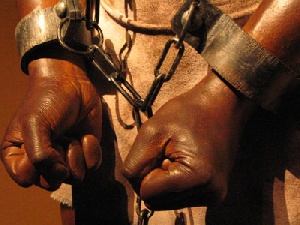Ghana has been ranked the 34th country with the most modern slaves out of 167 countries in the world, with survey results estimating that there are 103,300 people enslaved in the country.
According to the Global Slavery Index Report released on Tuesday, out of the 103,300 enslaved people in Ghana, 85 percent are in forced labour in the fishing and farming industries, retail sales, manual labour and factory work while the remaining 15 percent are in forced marriages.
The Report also listed Ghana as number 13 out of 15 countries in Sub-Saharan Africa on its Prevalence Index Rank.
The Report estimated that 45.8 million men, women and children around the world are today trapped in modern slavery; 28% more than previously estimated and they are enslaved through human trafficking, forced labour, debt bondage, forced or servile marriage or commercial sexual exploitation.
North Korea is the country with the greatest prevalence of modern slavery, with 4.37% of its population estimated to be enslaved. It is also the country with the weakest government response in terms of actions taken to combat modern slavery. The next highest prevalence of slavery is found in Uzbekistan (3.97%), followed by Cambodia (1.65%).
Sub-Saharan Africa accounted for approximately 13.6% (6,245,800) of the world's total enslaved population. Within the region, the Democratic Republic of the Congo, Sudan, South Sudan, Somalia, and the Central African Republic have the highest prevalence of modern slavery (all 1.13%).
The Communications Manager for Challenging Heights, Miss Pomaa Arthur in a statement said that although the report is a reflection that Ghana is making some progress in bringing an end to modern slavery, more needed to be done.
“In 2014, the Global Slavery Index ranked Ghana 21st in the world and 8th in Sub-Saharan Africa with an estimated 193,100 people enslaved. It is good news that our prevalence rate is dropping but we shouldn’t forget that there are still 103,300 trapped in slavery in the country,” she said.
Miss Arthur said a better coordination between the Government and NGOs working to bring an end to slavery such as Challenging Heights which has rescued over 1,500 children from the Lake Volta would be very instrumental in tackling the issue of trafficking.
“It is estimated that there are 21,000 enslaved on the Lake Volta but the government’s responses in all areas of combating slavery such as prevention, protection, prosecution and policy implementation are very slow,” she added.
Miss Arthur urged the general public to take the issue of human trafficking and modern slavery seriously and make it their business to join the fight against the menace.
General News of Tuesday, 31 May 2016
Source: starrfmonline.com

















